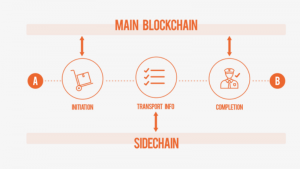
ShipChain, a blockchain specialist, has announced a partnership and pilot program with CaseStack, a provider of supply chain management services located in Fayetteville, Arkansas.
CaseStack works with some of the world’s largest retailers and Fortune 50 companies, including Target, Duracell and Amazon.
The deal has CaseStack committing to begin the integration process to accept SHIP tokens as payment for its services. CaseStack has purchased a block of SHIP tokens as a first step. The pilot program will integrate tracking and tracing on ShipChain’s blockchain based platform.
According to Dan Sanker, founder and CEO, CaseStack: “The blockchain is perfect solution for a lot of supply chain issues. CaseStack has partnered with ShipChain to iterate on a gamut of solutions. We … are partner(ing) with … ShipChain to apply blockchain technology to Supply Chain Management.
“There is currently $2.1 billion in investment in blockchain technology occurring (according to IDC). Supply chain in a blockchain world means that shippers and carriers discover each other without intermediaries, and execute smart contracts to define any requirements. Payment happens with crypto instantly without transaction fees or risks, and load movements are tracked on an honest, immutable ledger that nobody (and everyone) controls.”
Complementary advantages – ShipChain
The advantages claimed by ShipChain include moving:
- from poor tracking to end-to-end track and trace: tracking across multiple carriers is extremely fractured, and tracking provisions vary between modes of transportation whereas the ShipChain platform enables unified tracking across the entire supply chain, between all carriers.
- from no accountability to responsibility via incentives: the FBI estimates that cargo theft causes an annual loss within the United States of approximately $30 billion per year (and rising), with an average theft value of $190,000; operators receive rewards for efficient transport routes, and for delivering goods on time with theft reduced by the better tracking
- from middleman mark-up to platform integrity: brokers act as gatekeepers to the industry, typically charging a significant premium, sometimes up to 50%; with ShipChain there is no requirement for (but these can still be used when necessary; smaller carriers can operate independently
- from fractured communications to visibility: across the freight industry, transparency is a well documented problem; carriers don’t typically communicate with each other; with the ShipChain approach there is documentation of every step of the supply chain process, with records held on either the main blockchain or sidechains, which establishes full transparency and ease of communication.
Complementary advantages – CaseStack
For CaseStack, customers not only have the advantage of its volume transportation buying power, but they have access to dedicated customer service teams accustomed to placing nearly one million shipments per year with carriers experienced in handling full and partial loads. Available equipment options include:
- dry vans
- refrigerated trucks
- flatbeds.
Industries ‘peculiarities’ supported include:
- consumer and retail: freight movements between manufacturers, warehouses, distributors and retailers
- industrial: inbound flow of raw materials and parts, and outbound flow of finished goods.
- temperature sensitive: climate control of medical, pharmaceutical and other such freight
- highly regulated: rigorous oversight of regulated loads with fully compliant documentation
- high value: end-to-end visibility, with capabilities available where customers require special handling.
About ShipChain and CaseStack
ShipChain is a blockchain based solution provider for the transport and logistics industry. It offers a fully integrated platform across a supply chain. Participants can tracked products from (for example) farm to table in an open ecosystem. External players can integrate their own products and/or services.
CaseStack provides collaborative supply chain management services for consumer packaged goods (CPG) companies. The aim is to facilitate products moving from manufacturing plants through to retail channels. The CaseStack cloud technology platform enables CPG companies to manage:
- merchant interactions
- account management
- sourcing and forecasting
- item setups
- sell-through optimization
- logistics
- business analytics.

“By integrating with the more than one million loads CaseStack transports every year to major retailers, we have an amazing opportunity to implement both our tracking platform and driver rewards program,” says Sami Rusani, Chief Revenue Officer at ShipChain.”
“Blockchain really provides a once in a multi-generational opportunity to really transform the supply chain. The level of transparency and accountability it provides, along with the universally trusted automated smart contracts, give us new tools to increase efficiency more than we’ve ever seen,” says John Monarch, CEO at ShipChain.
Enterprise Times: what does this mean
Enterprise Times has noted the attention to supply chain handling, for example IBM and Maersk, DHL and Accenture and others). It seems that the competition heats up. More and more initiatives are emerging.
One notable, but not often commented factor, is that supply chain processing – because it is business to business – largely avoids the constraints and regulations of GDPR. Expect much more investment, and many more examples like ShipChain and CaseStack. The fact that GDPR concerns can ‘disappear, is a powerful incentive when so many supply chains touch Europe somewhere.


























